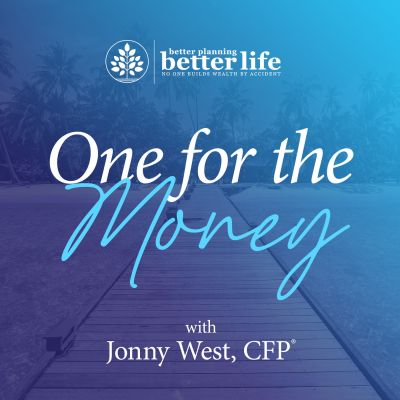Listen to hear Jonny break down the tips, tricks, and strategies he uses to help clients retire early. This is the "easy button" when it comes to early retirement because everything you want and need to know is right here. Jonny will lay it all out in plain English so you can get the details on the actions you can do to put yourself on the best path to early retirement. He'll also interview top real estate, tax, and estate planning and other professionals to provide a comprehensive approach to your retirement planning. Nobody builds wealth by accident. Listen to find out how you can do it on purpose.
https://one-for-the-money.captivate.fm
episode 24: Too Much Money & Too Few Memories
We often focus on the amount we need to retire comfortably. In this episode of the One for the Money podcast, you might be surprised to learn that most retirees die with too much money and too few memories. I’m not advocating that we reduce our savings for retirement. Instead, we should enjoy the fruits of our labor both before and during retirement.
In this episode...- The strongest force in the universe [01:29]
- Spending just the earnings [02:37]
- Why do people die with so much money? [04:51]
- Making lasting memories [06:42]
- How to spend more, wisely [10:54]
Compound memories
Albert Einstein famously called compound interest the strongest force in the universe. I love showing people the remarkable growth that can come from small contributions given significant time. It’s astounding that if you invested $5,000 a year for 40 years, and your investments earned an average rate of return of 10% each year, the $200,000 contributions would grow to $2.2 million. That’s eleven times the original investment!
As remarkable as that is, I’ve found that there’s something that compounds even better than money: memories. Many retirees don’t spend down their money in retirement. According to a 2018 Investments and Wealth Institute study, nearly six in seven retirees spend down only the earrings in their portfolios. That means they spent only the money generated by their investment portfolios. These people use guaranteed income sources such as Social Security, dividends, and interest and don’t touch the principal.
Spending decisions in retirementMany retirees are unnecessarily constraining spending and living well below their means. Behavioral biases and predispositions may prevent individuals from making optimal spending decisions in retirement. Most people match their spending with their income, and when their expenses increase, they decrease their spending accordingly. In fact, many retirees save money in retirement rather than spending. According to the research, retirees with more than $100,000 of assets save 38% of their income.
According to a survey conducted by the Insured Retirement Institute, 48% of people prioritize a comfortable standard of living, while only 3% view leaving a legacy as their primary goal. The only other double-digit financial goal in this survey was protecting one’s current level of wealth. Most people’s goals in retirement are a comfortable standard of living and protecting the current level of wealth. The remaining common financial goals are minimizing taxes, better managing risk, funding college, improving cash flow, aggressively growing wealth, or some charitable giving. However, all of those were between 1% and 6%.
Confidence in spendingBased on my research and experience in my practice, I believe there are two primary reasons people don’t spend as much as they could. The first is that they’ve always been in a saving mode. Switching to a spending mode is difficult, especially when there is no longer a salary. Everything depends on the next egg. It’s why people with guaranteed sources of income, pensions, and annuities spend more in retirement. I believe there are better ways to spend more than using annuity, but it shows what an impact this can have. The second reason is what I would call the “just in case” expense. We financially plan for worst-case scenarios. However, there are ways to prepare without sacrificing the ability to make memories both now and in retirement.
Sometimes, some of the best help I can give clients is when I give them the confidence to spend on what they want to achieve. Then they can make memories that can last lifetimes. And when we make memories with our kids and grandkids, those memories will last lifetimes. Of course, we need to plan so that the fear of running out of money doesn’t leave us with a worse feeling of regret. Most retirees die with too much money and too many regrets. Some are nervous about spending, but with proper planning that accounts for multiple scenarios, you can have the confidence to spend both now and in retirement to make memories, achieve your dreams, and have a life with less regret.
Resources & People Mentioned- The Decumulation Paradox: Why retirees are not spending more?
- Regrets of the dying
- Why Most Retirees Never Spend Their Retirement Assets
- Insured Retirement Institute
Connect with Jonny West
- https://BetterPlanningBetterLife.com
- Connect with Jonny on LinkedIn
Subscribe to ONE FOR THE MONEY on
Apple Podcasts, Spotify, Google Podcasts
Audio Production and Show notes by
PODCAST FAST TRACK
